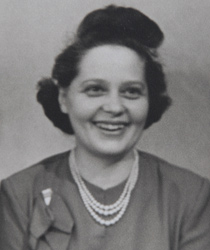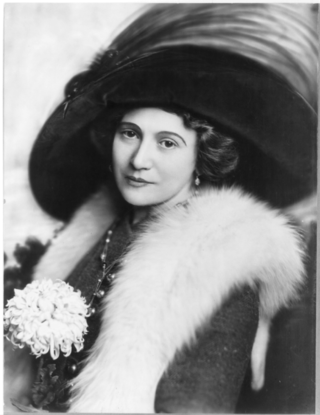
Crossing Delancey is a 1988 American romantic comedy film adapted by Susan Sandler from her play of the same name, and directed by Joan Micklin Silver. It stars Amy Irving and Peter Riegert. The film also features performances from Reizl Bozyk, David Hyde-Pierce, Sylvia Miles and Rosemary Harris. Amy Irving was nominated for a Golden Globe for the film, for Best Actress in a Motion Picture - Comedy or Musical.

Lillian Gertrud Asplund was an American secretarial worker who was one of the last three living survivors of the sinking of RMS Titanic on April 15, 1912, and the last living survivor who could recall the disaster.

Kugel is a baked casserole, most commonly made from lokshen or potato. It is a traditional Ashkenazi Jewish dish, often served on Shabbat and Jewish holidays. American Jews also serve it for Thanksgiving dinner.

Jewish cuisine refers to the worldwide cooking traditions of the Jewish people. During its evolution over the course of many centuries, it has been shaped by Jewish dietary laws (kashrut), Jewish festivals and holidays, and traditions centred around Shabbat. Jewish cuisine is influenced by the economics, agriculture, and culinary traditions of the many countries where Jewish communities have settled and varies widely throughout the entire world.

Matzah balls or matzo balls are Ashkenazi Jewish soup morsels made from a mixture of matzah meal, beaten eggs, water, and a fat, such as oil, margarine, or chicken fat. Known as knaidel in Yiddish, they resemble a matzah meal version of knödel, bread dumplings popular throughout Central European and East European cuisine.

Bertha Kalich was a Ukrainian-Jewish-American actress. Though she was well-established as an entertainer in Eastern Europe, she is best remembered as one of the several "larger-than-life" figures that dominated New York stages during the "Golden Age" of American Yiddish Theatre during the late nineteenth and early twentieth century. Historians estimate that, during her career, Kalich performed more than 125 different roles in seven different languages.

Abraham Sutzkever was an acclaimed Yiddish poet. The New York Times wrote that Sutzkever was "the greatest poet of the Holocaust."

Shiksa is an often disparaging, although not always, term for a gentile woman or girl. The word, which is of Yiddish origin, has moved into English usage and some Hebrew usage, mostly in North American Jewish culture.

Rugelach is a filled baked confection originating in the Jewish communities of Poland. It is popular in Israel, commonly found in most cafes and bakeries. It is also a popular treat among Jews in the diaspora.

Gribenes or grieven is a dish consisting of crisp chicken or goose skin cracklings with fried onions.

Kishka or kishke refers to various types of sausage or stuffed intestine with a filling made from a combination of meat and meal, often grain or potato. The dish is popular across Eastern Europe as well as with immigrant communities from those areas. It is also eaten by Ashkenazi Jews who prepare their version according to kashrut dietary laws.
Norene Lynn Gilletz was a Canadian Jewish cookbook writer, food consultant, and food writer.
Jamie Geller is the Chief Media and Marketing Officer at Aish. She is also a best-selling cookbook author, celebrity chef, television producer and businesswoman. She is an author of 8 cookbooks and the founder of Kosher Media Network. In 2010, the network launched the Joy of Kosher with Jamie Geller online cooking show, print magazine and PBS Chanukah special. She has been called "The Kosher Rachael Ray" by the Miami Herald. and the Queen of Kosher: Geller has sold close to 100,000 cookbooks.
Yiddish words used in the English language include both words that have been assimilated into English – used by both Yiddish and English speakers – and many that have not. An English sentence that uses either may be described by some as Yinglish, though a secondary sense of the term describes the distinctive way certain Jews in English-speaking countries add many Yiddish words into their conversation, beyond general Yiddish words and phrases used by English speakers.
Aliza Greenblatt was an American Yiddish poet. Many of her poems, which were widely published in the Yiddish press, were also set to music and recorded by composers including Abraham Ellstein, Solomon Golub, and Esther Zweig. They were also recorded by Theodore Bikel and Sidor Belarsky, among others. Greenblatt published five volumes of Yiddish poetry and an autobiography in Yiddish, Baym fentsṭer fun a lebn and her works include such well-known Yiddish songs as Fisherlid, Amar Abaye, and Du, Du.
Gilbert Stanley Marks was an American food writer and historian noted for his reference and cookbooks on the subject of Jewish food. He was the founding editor of Kosher Gourmet magazine. He moved to Israel and became a citizen in 2012 and died of lung cancer on December 5, 2014, at the hospice at Hadassah Hospital in Jerusalem.
Susan Beth Fishbein is an American Orthodox Jewish kosher cookbook author, cooking teacher, and culinary tour leader. Her Kosher By Design series of cookbooks was a runaway best-seller for ArtScroll, with over 500,000 copies sold. In 2008 she was included on the Forward 50 as one of the 50 most influential Jews.

The Jewish Healthcare Center is a nursing home and rehabilitation hospital at 629 Salisbury Street in Worcester, Massachusetts. The JHC services 2,500 clients per year, 70 percent of whom are not Jewish.

A babka is a sweet braided bread which originated in the Jewish communities of Poland and Ukraine. It is popular in Israel and in the Jewish diaspora. It is prepared with a yeast-leavened dough that is rolled out and spread with a filling such as chocolate, cinnamon, fruit, or cheese, then rolled up and braided before baking.

Ashkenazi Jewish cuisine is an assortment of cooking traditions that was developed by the Ashkenazi Jews of Central, Eastern and Northern Europe, and their descendants, particularly in the United States and other Western countries.














